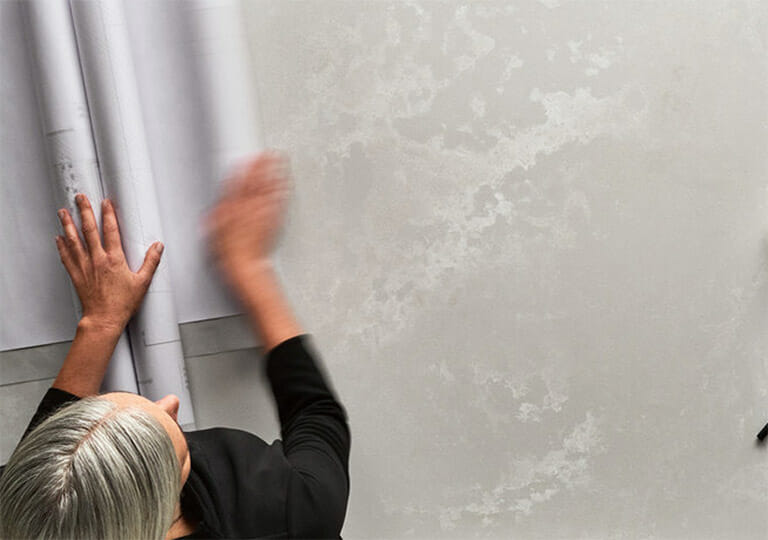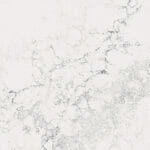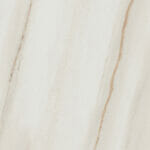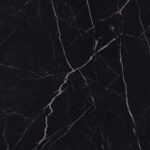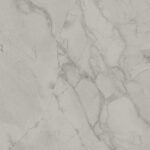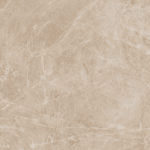Perhaps epoxy countertops are somewhat popular among homeowners looking for something that they can install themselves to revitalize an old surface. However, they present a number of challenges that make them impractical for many lifestyles — especially considering the increasing affordability of simply installing a new surface (like quartz) altogether.
In this guide, we’ll explore these challenges and alternatives to give you all the information you need to make an informed decision.
What are Epoxy Countertops
Unlike laminate, granite or quartz countertops, epoxy does not come in pre-made slabs that you can pick up from a supplier and have installed in your kitchen or bathroom. Rather, it’s a type of refinishing product that you buy in the form of an epoxy countertops kit and then use to refinish an existing material.
Note: You can find pre-made epoxy countertops but these are very costly, which is emblematic of a major issue associated with epoxy that we’ll explore shortly.
Consumers commonly place an epoxy countertop over laminate, wood, concrete, or ceramic that has become worn out. This creates a shiny, glossy finish and protects the surface underneath.
How are Epoxy Countertops Made
An epoxy countertops kit typically comes in a box or bottle that you apply to your kitchen countertops according to the manufacturer’s instructions.
There are many types of epoxies available but they all combine resin and hardener to produce a clear, durable solid. Typical instructions involve flooding the countertop material with a thin layer of epoxy as an initial seal. This prevents the formation of bubbles as you apply thicker coats later on in the process.
This is easier said than done, however; installing an epoxy countertop over laminate or other materials is a science and getting it wrong can easily negate any benefits one was anticipating.
Speaking of which, let’s explore the pros and cons of refinishing an old countertop with epoxy products.
Epoxy Countertops Pros and Cons
Pros
Durability
Are epoxy countertops durable? Yes — in some ways.
When done right, epoxy countertops provide a long-lasting and durable surface. Their non-porous nature means they’re resistant to moisture. The material is also resistant enough to heat, although you still need to use common sense and not place hot pots and pans on it.
Appearance
Epoxy countertops provide a glossy look that can make cheap materials like laminate or worn-out wood seem more luxurious. In theory, this is great for recycling old countertop materials that epoxy bonds well to.
Unfortunately, this is where the advantages of epoxy countertops end.
Cons
Installation is Messy and Requires Great Expertise
While many epoxy countertops kit manufacturers would have you believe they’re a breeze to install, in reality they are a nightmare. Many an epoxy countertop review will show you how challenging they are to get right — even for experienced DIYers.
It’s very easy to make mistakes and end up with a surface that has air bubbles and lumps. Beyond this, the “self-levelling” nature of many kits means the epoxy will race towards the edges and drip off, making a mess of the work area.
This is especially a nightmare considering the next downside of epoxy countertops.
You Only Have One Shot
Many people are drawn to epoxy countertops by the hope of being able to create custom patterns and finishes. The issue? Unlike materials that you buy in slabs that have been pre-finished by professionals, you only have one shot with epoxy countertops.
Messing up doesn’t mean just going out and buying a new epoxy countertops kit; it also means having to buy a whole new surface to apply that kit to, and then hoping you don’t mess up that attempt as well.
Epoxy Countertops Cost
Adding to the pressure of having to get epoxy countertops right on the first try is the fact that they aren’t cheap. The kits themselves will cost you anywhere from $100 to $200 and beyond. If you hire a professional (which is recommended) to install the countertop for you, expect to spend up to $100 per square foot.
That’s within the ballpark of more durable countertop materials that aren’t as much of a hassle to install.
Caring for Epoxy Countertops is a Pain Compared to Other Materials
Epoxy countertops durability is decent when it comes to heat resistance — but spills left for too long can test the durability of the epoxy resin and cause permanent stains. This makes caring for them a bit of a hassle — especially after the struggle one goes through to create them in the first place.
Alternatives to Epoxy Countertops
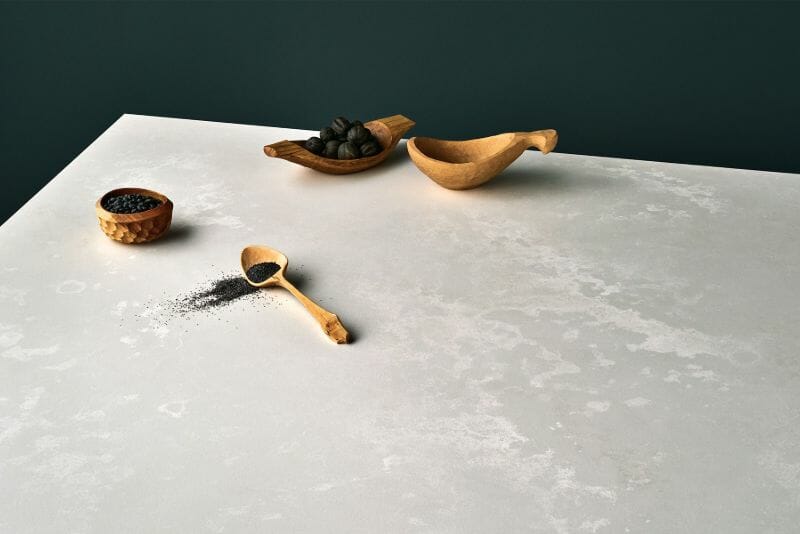
In light of the many downsides of epoxy countertops, you’ll be pleased to note that there are alternatives for creating a similarly-adventurous look. One alternative, in particular, rises above the rest, but let’s first explore the others.
Recycled Glass Countertops
Epoxy countertops are popular among those looking for a creative, unique look. Recycled glass can provide this uniqueness without the hassle and mess of creating the surface on-site. Rather, recycled glass countertops can be purchased offsite and simply installed.
Downsides of recycled glass countertops include susceptibility to cracking. Further, common cooking ingredients like tomato sauce are acidic enough to damage them. These disadvantages coupled with the price makes recycled glass countertops less of a value proposition compared to other materials.
DIY Tile Countertops
If you’re set on putting your hands to work, you may find installing tiled countertops to be an easier and more forgiving affair than an epoxy countertops kit. It’s still a challenge, but ceramic tiles can always be removed and replaced if things go awry. Unlike with epoxy countertops, you don’t need to scrap the entire surface and start again.
There are still downsides, however, the most notable being that tile countertops look old-fashioned and debris can easily get caught up in the grout, which is very unhygienic.
The Quartz Countertop Advantage
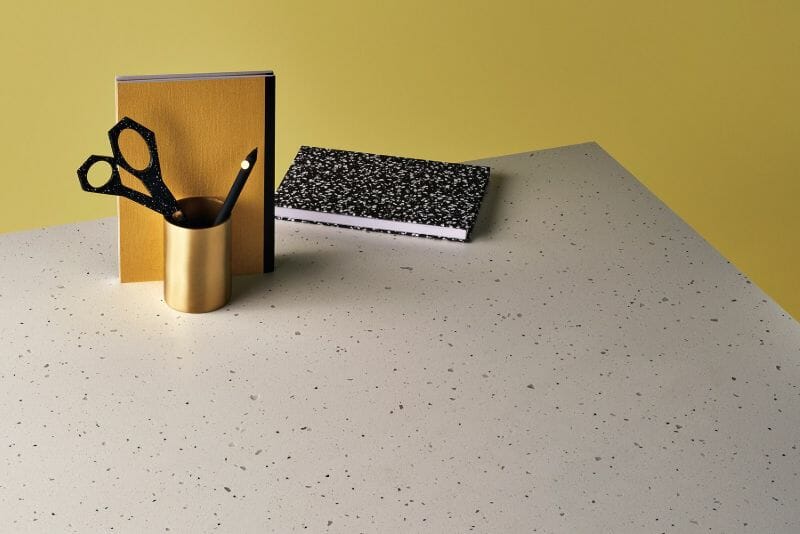
Quartz countertops provide a look that is even more stunning than epoxy — without all the hassle.
As mentioned earlier, one of the primary draws of epoxy countertops is the opportunity they provide for the creation of a unique, visually stunning surface.
Quartz is a solid-surface countertop material that provides even greater aesthetic appeal while providing a much more headache-free installation experience.
Quartz countertops are manufactured off-site in the form of slabs that professionals then install in your home. Yes, you lose some of the hands-on appeal — but anyone who has attempted DIY epoxy countertops will tell you this is a plus, not a downside.
Here are some of the benefits of using quartz countertops in the kitchen as opposed to epoxy.
Easier to Install
As mentioned previously, a quartz countertop does not need to be constructed on-site and then installed in one go. Rather, you can rely on the expertise of professionals who manufacture quartz slabs for a living.
Even for custom installations, the bulk of the work (i.e. molding the countertop to the desired shape) is done off-site, meaning the surface can be installed in a matter of hours.
Further, the coating of this material is baked in. You don’t need to worry about applying (or re-applying) messy finishers or sealants in your kitchen, making quartz countertop maintenance a breeze.
More Options
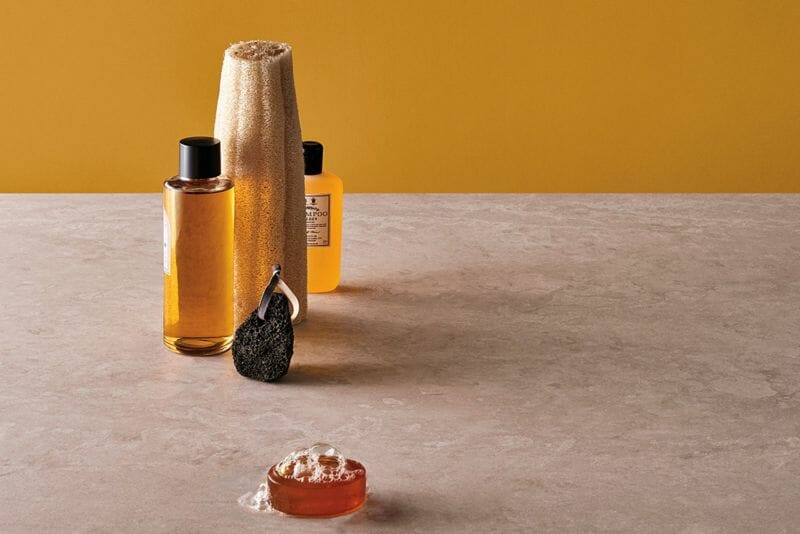
Quartz comes in a multitude of designs. Kitchen island trends are constantly changing. As such, that custom epoxy countertop you installed yourself will likely look dated before long.
With quartz countertops, however, you have access to countless classic designs curated by professionals that keep up with trends.
Because quartz is engineered stone, you have more options as far as color, patterns, and shape than natural stone. This ensures they fit into any kitchen style imaginable — and are significantly more stunning than epoxy.
Increased Home Value
Quartz countertops are the most desireable surface on the market. From cheap countertops like laminate to expensive ones like epoxy or granite, it’s hard to beat the value retention of quartz.
Quartz is a luxurious material that is quickly gaining popularity in commercial, industrial, and residential design alike.
With epoxy countertops, cost is not the only factor contributing to their diminished appeal and value retention compared to quartz. Other factors include their highly customized nature; while this may appeal to you as the current homeowner, it can come back to haunt you when you attempt to sell your home.
A great way to ensure you recoup as much of your kitchen countertop upgrade cost as possible is to select a popular material designed by professionals — and quartz more than delivers on both counts.
The Caesarstone Quartz Advantage
When it comes to quartz countertops, Caesarstone is the undisputed leader. We produce countertops to the highest possible standards, inspecting our slabs thoroughly to ensure optimal quality at each stage.
We partner with leading interior designers to create countertops that don’t just follow trends — but set them as well.
In addition to our quartz slabs that put epoxy to shame, those operating on a budget can use Transform by Caesarstone, our countertop resurfacing kit. This kit is somewhat similar to epoxy countertop resurfacing, except instead of covering your old surfaces with a messy and finicky epoxy and resin formula, we ‘cap’ them with a layer of quartz.
In Summary
This epoxy countertops review should leave you with a clear idea of why the material is less-than-ideal for anyone other than professionals to install. Even then, epoxy countertops’
cost places them within the territory of better materials, including quartz.
Epoxy countertops pros and cons lean heavily to the downsides; they’re messy to install, require you to get things right on the first try, and are not nearly as durable or desirable as quartz.
Frequently Asked Questions
How much do epoxy countertops cost?
Epoxy countertops can cost between $100 and $200 per square foot for surfaces produced by professionals. Even DIY epoxy countertops kit can cost between $100 to $200 — plus your sanity, considering how difficult they are to install.
How durable are epoxy countertops?
Epoxy countertops are reasonably durable. They’re resistant to moisture and reasonably resistant to heat but stain much easier than a material like quartz.
Are epoxy countertops heat-resistant?
Epoxy countertops are less heat-resistant than granite but still maintain a reasonable level of heat-resistance that makes them suitable for day-to-day use in this regard.
Is it easy to make an epoxy countertop?
Not at all; it’s very easy to make mistakes and end up with a countertop that has air bubbles or lumps. There’s a reason a pre-made epoxy countertop can cost as much as $200 per square foot.
